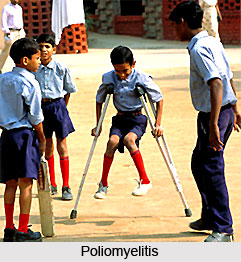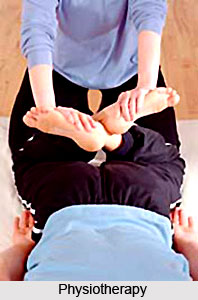 Poliomyelitis is commonly referred to as polio, is a form of infantile paralysis, which mostly attacks children. Polio is actually a viral disease that may affect the central nervous system. Since polio immunization has become widespread, cases of polio are very rare.
Poliomyelitis is commonly referred to as polio, is a form of infantile paralysis, which mostly attacks children. Polio is actually a viral disease that may affect the central nervous system. Since polio immunization has become widespread, cases of polio are very rare.
Polio is more common in infants and young children and occurs under conditions of poor hygiene. However, paralysis is more common and more severe when infection occurs in older individuals. In exceedingly rare cases, oral polio vaccine has caused paralytic polio in a person who received the vaccine or in a person who was a close contact of a vaccine recipient.
Causes and Symptoms: Allopathy believes that poliomyelitis is the result of an infectious disease involving the spinal cord and the brain. It starts as a slight indisposition in the child when he may be a little `off colour`. Fever is followed by loss of muscle tone, and finally, paralysis. In some cases, paralysis of the limbs may come on quite suddenly, usually with a sharp rise in temperature. The child may go to bed in seemingly good health, but may wake up totally paralyzed in the next morning. The severity of the disease depends on which internal organ has been seriously affected. If the respiratory muscles have been affected, it may bring on death. But if only the spinal cord is affected, the lower limbs may be paralyzed. In most of the cases that is the case. If untreated, the leg muscles may atrophy, giving the limbs a dried-up look. Modern medicine has developed a vaccine, available in the form of drops, which gives immunity to infants against polio.
Symptoms of the disease include fever, malaise, headache, nausea and vomiting, excruciating muscle pain and stiffness in the neck and back.
 Ayurveda maintains that the various forms of paralysis known as Pakshaghata, Ardhangaghata, Ekangaghata and Sarvangaghata are the result of the vitiation of vata.
Ayurveda maintains that the various forms of paralysis known as Pakshaghata, Ardhangaghata, Ekangaghata and Sarvangaghata are the result of the vitiation of vata.
Medicines and Prescriptions: In the initial stages of polio, that is, the first three weeks, the following line of treatment can be adopted with advantage:
1. Balachalurbhadra Churna; Mukta Pishti: 1 gm Balachaturbhadra Churna and 30 gm Mukta Pishti to be taken thrice daily with powdered cardamom and honey.
2. Medicated Castor oil: 5 ml to be given early morning with Rasnadi and Dashamoola Quath.
3. Dhara Sweda: Pouring of warm decoctions over the affected organs from a height of four inches is recommended. The decoctions should be made of the drug mentioned in above remedy.
After three weeks, the following line of treatment should be adopted:
1. Rajat Bhasma; Yasad Bhasma; Seesaka Bhasma: 15-30 mg of Rajat Bhasma, 30-60 mg of Yasad Bhasma, 15-30 mg of Seesaka Bhasma to be taken twice daily with decoction of Prasarini or Paedaria foctida .
2. Mahanarayana Taila: This should be used for massaging the affected parts. Fomentation is recommended with a pounded mass of garlic, rock salt, ajwain, horse gram, cotton seed, black gram, castor seeds, linseed-tied in a piece of cloth.
A hot water bag may be used to relieve pain.
Diet and Other Regimen: The patient is advised to take light, easily digestible food. Physiotherapy is recommended for the afflicted parts of the body. In case of constipation, a glycerin enema should be given.




















